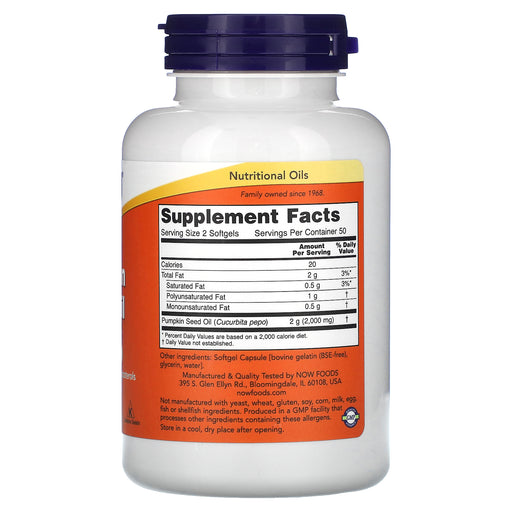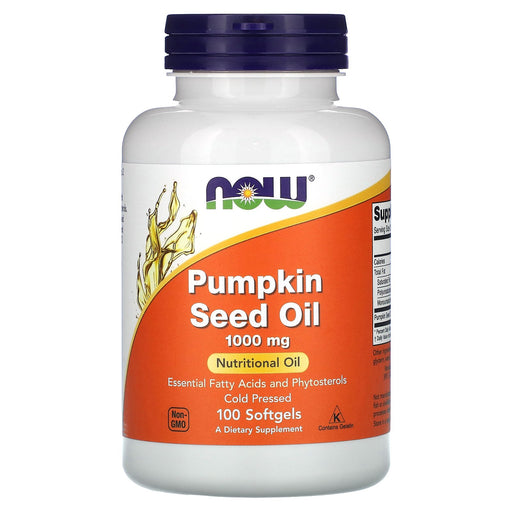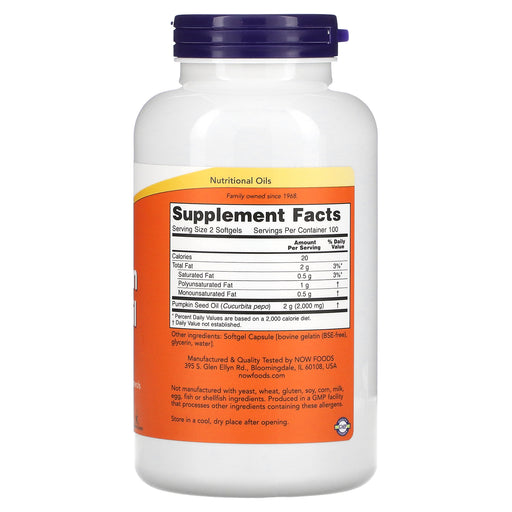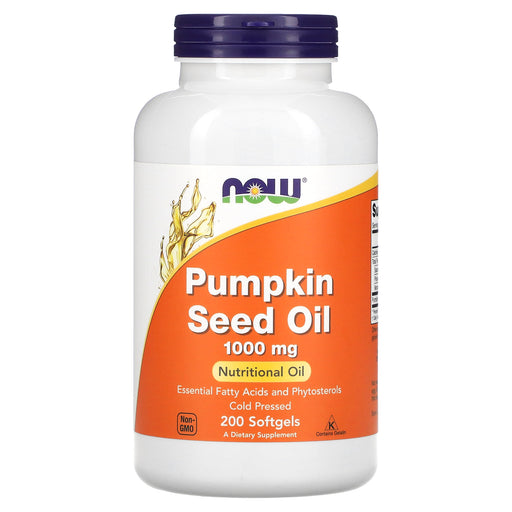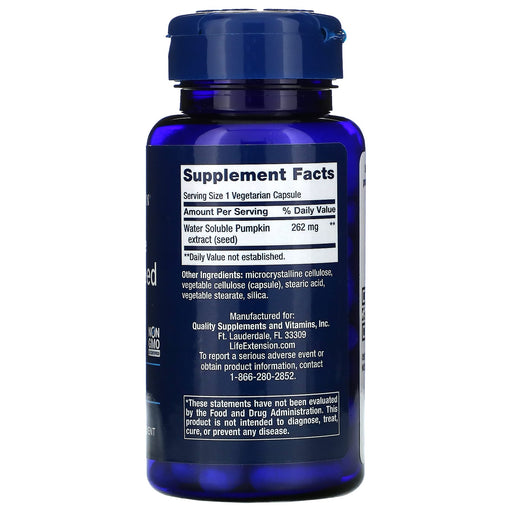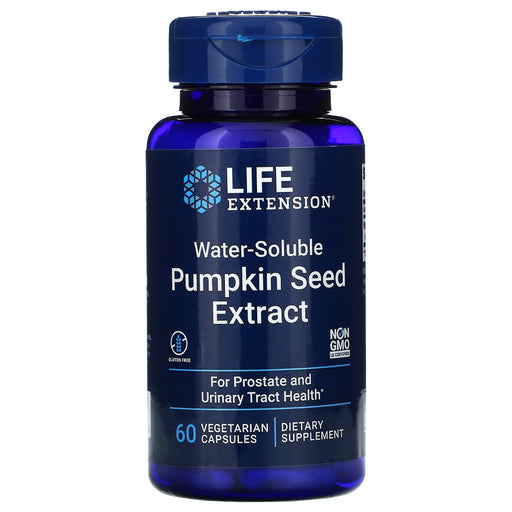
Experience the Nutritional Power of Pumpkin Seed Oil for Prostate Health and Beyond
Pumpkin seed oil, derived from the nutrient-rich seeds of the pumpkin plant (Cucurbita pepo), has gained recognition for its potential to support various aspects of health, particularly prostate function and urinary tract health in men. Rich in essential fatty acids, antioxidants, and phytosterols, pumpkin seed oil supplements offer a natural way to promote overall health and well-being.
The Nutritional Profile of Pumpkin Seed Oil
Pumpkin seed oil is a nutrient-dense superfood that contains an impressive array of health-promoting compounds, including:
- Essential Fatty Acids: Pumpkin seed oil is rich in omega-3 and omega-6 fatty acids, particularly linoleic acid, which play crucial roles in maintaining healthy skin, reducing inflammation, and supporting cardiovascular health.
- Phytosterols: These plant-based compounds, such as beta-sitosterol, have been shown to support prostate health by helping to maintain healthy hormone balance and reducing inflammation in the prostate gland.
- Antioxidants: Pumpkin seed oil contains potent antioxidants, including vitamin E and carotenoids, which help protect cells from oxidative stress and support overall health and longevity.
- Zinc: Pumpkin seeds are one of the best natural sources of zinc, a mineral essential for immune function, wound healing, and reproductive health. Zinc is particularly important for male health, as it supports testosterone production and prostate function.
- Magnesium: Another mineral found in pumpkin seed oil, magnesium is crucial for energy production, bone health, and muscle and nerve function.
Benefits of Pumpkin Seed Oil Supplementation
Incorporating pumpkin seed oil supplements into your health routine may offer several potential benefits, including:
- Prostate Health Support: The phytosterols and zinc in pumpkin seed oil have been shown to support prostate health by helping to maintain healthy prostate size and function, reducing inflammation, and promoting overall urinary tract health in men.
- Urinary Tract Health: Pumpkin seed oil may help support bladder function and reduce symptoms of overactive bladder, such as frequent urination and urgency, thanks to its anti-inflammatory and muscle-relaxing properties.
- Heart Health: The essential fatty acids in pumpkin seed oil, particularly omega-3s, can help support cardiovascular health by promoting healthy blood lipid levels, reducing inflammation, and supporting healthy blood vessel function.
- Skin Health: The antioxidants and essential fatty acids in pumpkin seed oil may help support healthy skin by reducing inflammation, promoting collagen production, and protecting against UV damage.
- Hormone Balance: The zinc and phytosterols in pumpkin seed oil can help support healthy hormone balance, particularly in men, by promoting healthy testosterone levels and reducing the conversion of testosterone to dihydrotestosterone (DHT), a hormone linked to prostate enlargement.
Choosing the Best Pumpkin Seed Oil Supplement
When selecting a pumpkin seed oil supplement, consider the following factors to ensure you choose a high-quality product that meets your needs:
- Quality and Purity: Look for supplements that use high-quality, cold-pressed pumpkin seed oil, free from contaminants and artificial additives. Cold-pressing helps preserve the delicate nutrients and bioactive compounds in the oil.
- Potency: Choose supplements that provide a clinically effective dose of pumpkin seed oil, typically ranging from 500-1000 mg per serving.
- Omega Fatty Acid Content: Opt for supplements that provide a balanced ratio of omega-3 to omega-6 fatty acids, as this balance is essential for optimal health and reducing inflammation.
- Synergistic Ingredients: Consider supplements that combine pumpkin seed oil with other prostate-supportive nutrients, such as saw palmetto, pygeum, or lycopene, for a more comprehensive approach to men's health.
- Brand Reputation: Select supplements from reputable brands with a history of producing high-quality, science-backed products and a commitment to transparency and safety. Look for supplements that are manufactured in GMP-certified facilities and third-party tested for purity and potency.
Maximizing the Benefits of Pumpkin Seed Oil Supplements
To get the most out of your pumpkin seed oil supplement, consider the following tips:
- Follow Dosage Instructions: Adhere to the recommended dosage on the product label, and consult with your healthcare provider before starting any new supplement regimen, especially if you have pre-existing health conditions or are taking medications.
- Pair with a Balanced Diet: While pumpkin seed oil supplements can provide valuable nutritional support, they should be used in conjunction with a balanced, nutrient-rich diet that includes plenty of whole foods, fruits, vegetables, and healthy fats.
- Stay Hydrated: Drink plenty of water throughout the day to support optimal nutrient absorption and overall health.
- Store Properly: Keep your pumpkin seed oil supplement in a cool, dry place, away from direct sunlight and heat, to maintain its potency and freshness.
- Consider Lifestyle Factors: Maximize the benefits of pumpkin seed oil supplementation by combining it with other prostate-supportive lifestyle habits, such as regular exercise, stress management, and maintaining a healthy body weight.
Unleash the Nutritional Power of Pumpkin Seed Oil for Optimal Health and Well-Being
If you're looking to support prostate health, urinary tract function, and overall well-being, pumpkin seed oil supplements may be a valuable addition to your wellness routine. By providing a rich source of essential fatty acids, antioxidants, phytosterols, and minerals like zinc and magnesium, pumpkin seed oil can help you unleash your full potential for vitality and optimal health.
Experience the transformative potential of this nutrient-dense superfood by exploring our curated selection of high-quality pumpkin seed oil supplements. With a commitment to purity, potency, and your individual needs, Health Orchard is here to support you on your journey toward optimal health, prostate function, and overall well-being.
Frequently Asked Questions about Pumpkin Seed Oil
1. What are the benefits of pumpkin seed oil capsules?
Pumpkin seed oil capsules offer several potential benefits:
- Rich in essential fatty acids, including omega-3 and omega-6, which support heart and brain health
- Contains phytosterols that may help maintain healthy cholesterol levels
- Provides antioxidants, such as vitamin E, to combat oxidative stress
- May support prostate health due to its content of beta-sitosterol and other beneficial compounds
- Could help alleviate benign prostatic hyperplasia (BPH) symptoms
- May have anti-inflammatory properties
- Potential benefits for hair and skin health
As with any supplement, consult a healthcare professional to determine if pumpkin seed oil capsules are appropriate for your individual needs.
2. Can I take pumpkin seed oil every day?
Yes, pumpkin seed oil can generally be taken daily as a supplement. The recommended dosage varies depending on the specific product and individual needs, but most capsules contain between 500-1000 mg of pumpkin seed oil per serving. It is essential to follow the dosage instructions provided by the manufacturer and not exceed the recommended daily intake. If you have any pre-existing health conditions or are taking medications, consult your healthcare provider before starting daily supplementation with pumpkin seed oil to ensure safety and rule out potential interactions.
3. What are the side effects of pumpkin seed oil capsules?
Pumpkin seed oil capsules are generally well-tolerated, and side effects are rare when taken in recommended dosages. However, potential side effects may include:
- Digestive discomfort, such as nausea, diarrhea, or stomach pain
- Allergic reactions in individuals sensitive to pumpkin seeds
- Interference with blood clotting, particularly in high doses or when combined with blood-thinning medications
- Lowered blood sugar levels, which may be a concern for people with diabetes
If you experience any adverse effects while taking pumpkin seed oil capsules, discontinue use and consult your healthcare provider. It is also important to inform your doctor about all supplements you are taking to avoid potential interactions with medications or other treatments.
4. Is pumpkin seed oil safe for your liver?
Pumpkin seed oil is generally considered safe for the liver when consumed in recommended amounts. In fact, some studies suggest that pumpkin seed oil may have potential liver-protective properties due to its content of antioxidants and beneficial fatty acids. These compounds may help combat oxidative stress and inflammation, which can contribute to liver damage. However, it is essential to note that excessive consumption of any fat, including healthy fats like those found in pumpkin seed oil, can put additional strain on the liver. If you have pre-existing liver conditions, consult your healthcare provider before adding pumpkin seed oil supplements to your regimen.
5. Does pumpkin seed oil affect kidneys?
Pumpkin seed oil is not known to have any direct negative effects on kidney function when consumed in recommended amounts. However, individuals with pre-existing kidney conditions or those taking medications that affect kidney function should exercise caution and consult their healthcare provider before taking pumpkin seed oil supplements. In some cases, high doses of pumpkin seed oil may increase the risk of kidney stones in susceptible individuals due to its content of phytosterols. Additionally, pumpkin seed oil may interact with certain medications, such as diuretics or blood pressure-lowering drugs, which could impact kidney function. As with any supplement, it is essential to discuss its use with a qualified healthcare professional to ensure safety and compatibility with your individual health status.
6. Is pumpkin oil good for kidneys?
Pumpkin oil may offer some potential benefits for kidney health, although more research is needed to confirm these effects in humans. Some animal studies suggest that pumpkin oil may help protect the kidneys from oxidative stress and inflammation, which can contribute to kidney damage. The antioxidants and beneficial fatty acids found in pumpkin oil may play a role in this protective effect. Additionally, pumpkin oil may help support healthy blood pressure levels, which is important for maintaining kidney function. However, it is crucial to note that pumpkin oil should not be used as a substitute for prescribed kidney treatments or medications. If you have kidney-related health concerns, consult your healthcare provider before incorporating pumpkin oil into your diet or supplement regimen.
7. Is pumpkin seed high in uric acid?
Pumpkin seeds are relatively low in purines, which are compounds that can break down into uric acid in the body. Foods high in purines, such as organ meats, anchovies, and certain vegetables, can contribute to elevated uric acid levels, which may lead to gout or other health issues. However, pumpkin seeds and pumpkin seed oil are not considered high in purines and are generally safe for individuals with gout or other uric acid-related concerns. In fact, some studies suggest that the beneficial compounds in pumpkin seeds, such as antioxidants and healthy fats, may help support overall joint health. As always, it is best to consult with a healthcare professional to determine if pumpkin seeds or pumpkin seed oil are appropriate for your specific health needs.


